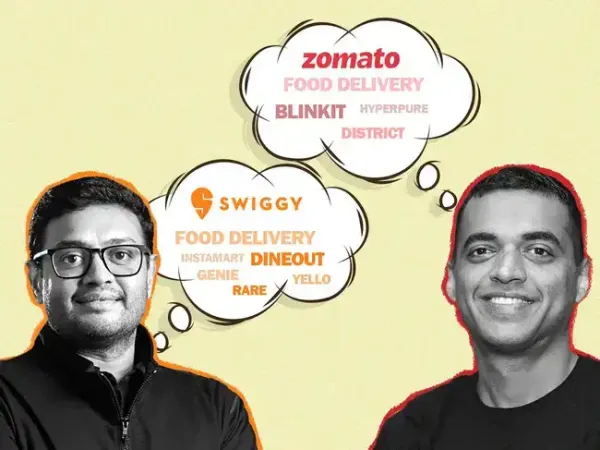
Listen to this article in summarized format
Loading...
×Ending a long-standing fight, food delivery platform Zomato has started discussions with the National Restaurants Association of India (NRAI) regarding the sharing of customer data with eateries. NRAI has also started similar discussions with Zomato’s rival Swiggy.
NRAI, which represents over five lakh restaurants across the country, has been lobbying for this for years now. So, what gives? Why are platforms agreeing to this?
Long-standing dispute
In 2021, NRAI filed a complaint with the Competition Commission of India (CCI) against Zomato and Swiggy for data masking, high commissions, and anti-competitive practices. In April 2022, CCI ordered a probe into the matter. A lot of legal thrust and parry between the parties followed, but things intensified in January this year after the platforms launched their 10-minute food delivery service.
NRAI accused both Swiggy and Zomato of breaching marketplace neutrality by expanding into private label brands through quick delivery apps like Swiggy’s Snacc and Blinkit’s Bistro.
While the matter is still pending before the CCI, Zomato on Wednesday agreed to share some customer data with restaurants. New entrant Ownly has also signed a deal with NRAI, agreeing to share valuable customer data with eateries.
Also Read | ETtech Explainer: Why Zomato and Swiggy want the NRAI out of the confidentiality ring
Why did platforms not share data earlier?
Until now, food delivery platforms have not shared customer data with restaurants and NRAI has accused them of data masking. Data masking is the practice of restricting access to data, allegedly done in this case to crimp competition.
However, a senior executive at a food delivery platform told ET on Wednesday that when aggregators have shared customer data with restaurants in the past, they have received negative feedback from users and have, therefore, stopped the practice.
“This time, we are working with the restaurants to ensure that the scope for using the data being shared is limited and well defined,” the executive said.
What data will be shared?
Zomato food delivery CEO Aditya Mangla said on Thursday that the company has begun rolling out a feature to take consent from customers to share their phone numbers with restaurants “to directly receive marketing and promotional updates (from them).”
Multiple restaurant owners ET spoke to said they haven’t received any communication from Zomato regarding customer data. “We haven’t received anything from Zomato on this, but user data like the phone number will help in retargeting them through other platforms, like WhatsApp,” said Neeraj Bora, cofounder and CEO, Cheesiano Pizza.
“The benefit from this depends on the kind of data they share — whether it's the data of new or old users, average order value, order type, etc,” he added.
According to analysts, order-level data and user behaviour insights at a pin code level could help restaurants understand trends and the competition better.
Why are food delivery platforms sharing the data?
This development comes at a time when the food delivery segment is plateauing, according to analysts.
“Food delivery platforms are trying to increase the frequency of online ordering,” said Satish Meena, founder of Datum Intelligence. “There’s not much they can do by themselves through discounting and offers. They also need restaurants to participate to improve the delivery frequency, and sharing customer data might help with this.”
For perspective, food delivery has grown 20% in FY25 while quick commerce has grown over 100%, according to Datum.
What are other marketplaces doing?
Customer data is central to the operation of a business. In the rapidly growing quick commerce segment, Zepto has launched Zepto Atom, a subscription-based data analytics and insights platform for brands.
Similarly, ecommerce platforms Amazon India and Flipkart provide their sellers with customer order insights and trends against the commission they charge.
NRAI, which represents over five lakh restaurants across the country, has been lobbying for this for years now. So, what gives? Why are platforms agreeing to this?
Long-standing dispute
In 2021, NRAI filed a complaint with the Competition Commission of India (CCI) against Zomato and Swiggy for data masking, high commissions, and anti-competitive practices. In April 2022, CCI ordered a probe into the matter. A lot of legal thrust and parry between the parties followed, but things intensified in January this year after the platforms launched their 10-minute food delivery service.
NRAI accused both Swiggy and Zomato of breaching marketplace neutrality by expanding into private label brands through quick delivery apps like Swiggy’s Snacc and Blinkit’s Bistro.
While the matter is still pending before the CCI, Zomato on Wednesday agreed to share some customer data with restaurants. New entrant Ownly has also signed a deal with NRAI, agreeing to share valuable customer data with eateries.
Also Read | ETtech Explainer: Why Zomato and Swiggy want the NRAI out of the confidentiality ring
Why did platforms not share data earlier?
Until now, food delivery platforms have not shared customer data with restaurants and NRAI has accused them of data masking. Data masking is the practice of restricting access to data, allegedly done in this case to crimp competition.
However, a senior executive at a food delivery platform told ET on Wednesday that when aggregators have shared customer data with restaurants in the past, they have received negative feedback from users and have, therefore, stopped the practice.
“This time, we are working with the restaurants to ensure that the scope for using the data being shared is limited and well defined,” the executive said.
What data will be shared?
Zomato food delivery CEO Aditya Mangla said on Thursday that the company has begun rolling out a feature to take consent from customers to share their phone numbers with restaurants “to directly receive marketing and promotional updates (from them).”
Multiple restaurant owners ET spoke to said they haven’t received any communication from Zomato regarding customer data. “We haven’t received anything from Zomato on this, but user data like the phone number will help in retargeting them through other platforms, like WhatsApp,” said Neeraj Bora, cofounder and CEO, Cheesiano Pizza.
“The benefit from this depends on the kind of data they share — whether it's the data of new or old users, average order value, order type, etc,” he added.
According to analysts, order-level data and user behaviour insights at a pin code level could help restaurants understand trends and the competition better.
Why are food delivery platforms sharing the data?
This development comes at a time when the food delivery segment is plateauing, according to analysts.
“Food delivery platforms are trying to increase the frequency of online ordering,” said Satish Meena, founder of Datum Intelligence. “There’s not much they can do by themselves through discounting and offers. They also need restaurants to participate to improve the delivery frequency, and sharing customer data might help with this.”
For perspective, food delivery has grown 20% in FY25 while quick commerce has grown over 100%, according to Datum.
What are other marketplaces doing?
Customer data is central to the operation of a business. In the rapidly growing quick commerce segment, Zepto has launched Zepto Atom, a subscription-based data analytics and insights platform for brands.
Similarly, ecommerce platforms Amazon India and Flipkart provide their sellers with customer order insights and trends against the commission they charge.





 Subscription
Subscription





